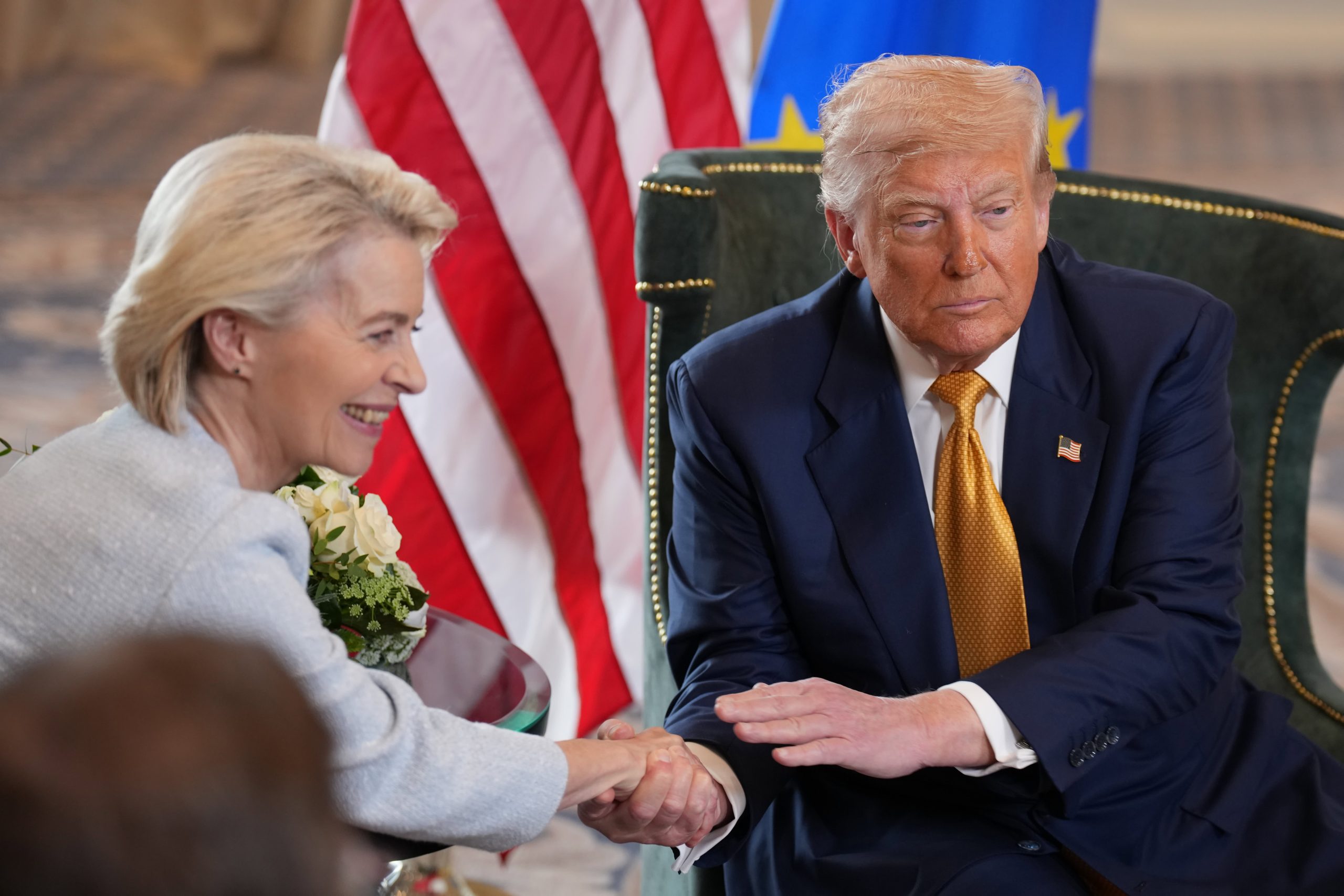Reports that U.S. President Donald Trump asked the European Union to slap tariffs of up to 100% on China and India for their Russian oil purchases has raised eyebrows on both sides of the Atlantic, with Europe seen as unlikely to acquiesce to the White House’s request.
Trump made the proposal — first reported by the Financial Times and confirmed to CNBC by two sources familiar with the matter — when he was called into a meeting with senior U.S. and EU officials in Washington on Tuesday. The U.S. was also prepared to “mirror” any tariffs imposed by Europe on the two countries, the FT’s report added. The White House has yet to respond to CNBC’s request for comments.
Asked to comment on Trump’s bid, a European Commission spokesperson told CNBC Wednesday it could not disclose meeting details due to confidentiality, noting, “The EU has engaged with all relevant global partners, including India and China, in the context of its sanctions enforcement efforts. This engagement will continue.”
The commission pointed to its 19th measures package its preparing against Moscow, saying it had “added new sanctions tools which allow us to target circumvention through third countries” and that the U.S. was a “crucially important partner” in Brussels’ efforts to pile pressure on Russia’s war economy.
Timing
Asking the EU to impose tariffs on key Russian energy clients India and China was seen as another way to punish their trade with Moscow and put pressure on Russia to end the war in Ukraine.
Yet European officials appear wary of alienating China and India, and the timing of Trump’s request has raised eyebrows because it Washington is negotiating a trade deal with New Delhi.
The U.S. has already imposed a 50% tariff on India, which includes a 25% punitive duty it for its Russian oil purchases. India says the tariffs are “unfair, unjustified and unreasonable,” while calling out the U.S. and the EU’s trade with Russia.
Ian Bremmer, founder of Eurasia Group, told CNBC Wednesday that the White House’s latest demand on the EU was “hard to square with Trump’s efforts to get to a trade deal with India and China, which he prioritizes over getting a ceasefire in Ukraine (let alone things like Transatlantic collective security and deterrence),” Bremmer said in emailed comments to CNBC.
“It looks more like an attempt to shift responsibility for a stronger response to Europe, creating political cover for American inaction on the sanctions front while avoiding a direct hit to U.S.-China relations.”
‘Europe should say no’
The EU is unlikely to acquiesce, analysts say. Not only would the bloc be wary of adopting Trump’s contentious tariffs strategy and burning its own bridges with India and China — despite an economic rivalry with the Asian superpowers — but the EU has its own complicated trading relationship with Russia.
“Everyone knows if the Europeans haven’t been able to wean themselves off Russian energy themselves more than 3.5 years into the war, they sure as hell aren’t going to cut themselves off from their top goods import supplier,” Eurasia Group’s Bremmer stated.
Other analysts noted that Europe, unlike Trump, has an aversion to imposing tariffs as part of a trade playbook, arguing that the bloc shouldn’t be drawn into his trade wars.
“No one in Europe believes tariffs are an effective trade policy tool … Europe would prefer diplomacy to address issues, rather than outright trade war,” Bill Blain, market strategist and founder of London-based Wind Shift Capital, said in his Morning Porridge newsletter on Wednesday.
“Europe’s response should be ‘no.’ Trump kicked the hornets nest – let him deal with the consequences. But let’s see what happens,” Blain concluded.
Russia connection
The EU has a complicated trading relationship with Russia. This is likely to prevent the bloc from punishing other nations for doing business with Moscow, when the EU does so too — albeit at a far lower level than before the Ukraine war began in 2022.
The EU’s bilateral trade with its neighbor stood at 67.5 billion euros ($78.1 billion) in 2024, according to European Commission data, with the EU’s imports were worth 35.9 billion euros and dominated by fuel and mining products. EU exports to Russia totaled 31.5 billion euros in 2024.
The EU has struggled to wean itself off Russian gas and LNG (liquefied natural gas) imports completely. Russia’s share of EU imports of pipeline gas dropped from over 40% in 2021 to about 11.6% in 2024, while Moscow accounted for less than 19% of total EU pipeline gas and LNG imports in 2024, the commission’s data notes.
The U.S. has encouraged its European allies to switch to U.S. LNG.
Trump said the EU had pledged, as part of its framework trade deal with the U.S. — which saw 15% tariffs imposed on the bloc’s exports to the States — to purchase U.S. LNG, oil and nuclear energy products with an expected offtake valued at $750 billion over the next three years.
U.S. Secretary of Interior Doug Burgum told CNBC Wednesday that the Trump administration is looking to drive up the U.S.’ market share of the energy sector in Europe.
“[Exporting] LNG would be one of the easiest things, [you can] put it on a ship, send it over here. Displace Russian gas, drive their market share to zero in Europe and drive U.S. market share up. That’s great for America, great for our allies, and we stop funding Russia’s side of the war,” he told CNBC at Gastech 2025.
International: Top News And Analysis
Read the full article <a href="Read More” target=”_blank”>here.


